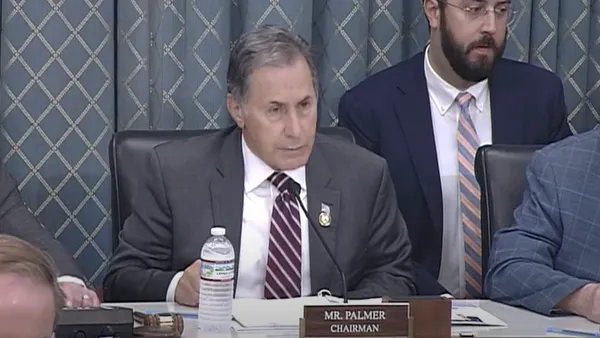UPDATE: S-981 was passed by a 60-12 vote and has advanced to Governor Christie's desk for a signature, as reported by NJ Spotlight. The bill would allow the state's Department of Environmental Protection to create a statewide standard around the collection, transportation and recycling of electronic waste. Manufacturers would be responsible for their market share of covered material by weight. While the bill is supported by recyclers and environmental groups alike, its fate is uncertain based on Christie's previous pocket veto of a similar bill.
Dive Brief:
- The New Jersey Department of Environmental Protection (DEP) has suggested amendments to electronic recycling bill S-981 which would shift responsibility to manufacturers and decrease state involvement, as reported by Resource Recycling.
- Manufacturers are currently required to provide "free and convenient" recycling of their products with collection sites in every county. Many municipalities say this hasn't been happening and manufacturers are hiring third-party vendors to collect the material. DEP did not present a plan to account for these "out of system" devices.
- DEP's proposed amendments also included a requirement for recycling companies to register with the state and stricter material handling standards at collection sites.
Dive Insight:
Recyclers and municipalities have criticized the state's current system because it allows manufacturers to step back after meeting annual recycling targets, creating a patchwork of underfunded local programs. This approach has led to similar issues in Illinois and New York. In the latter, $3 million in state grants have been made available to help municipalities deal with these unexpected costs.
While placing the onus on recyclers to pay for the disposal of their products does line up with the concept of extended producer responsibility the realities of this have been much more complicated. Low commodity prices have made it expensive to handle older devices, companies may go out of business and manufacturer-run programs can also disincentivize repair or refurbishment. Many other states, including Minnesota, North Carolina and Pennsylvania, have moved to update their laws in response to these factors.
New Jersey DEP's more hands-off approach seems to be in line with Governor Chris Christie's stance. Christie vetoed a similar bill in January that would have based manufacturers' obligations on the weight of material collected each year. State legislators are currently considering whether to move forward with the amended version of S-981 or go with the original version and risk another veto from Christie.










